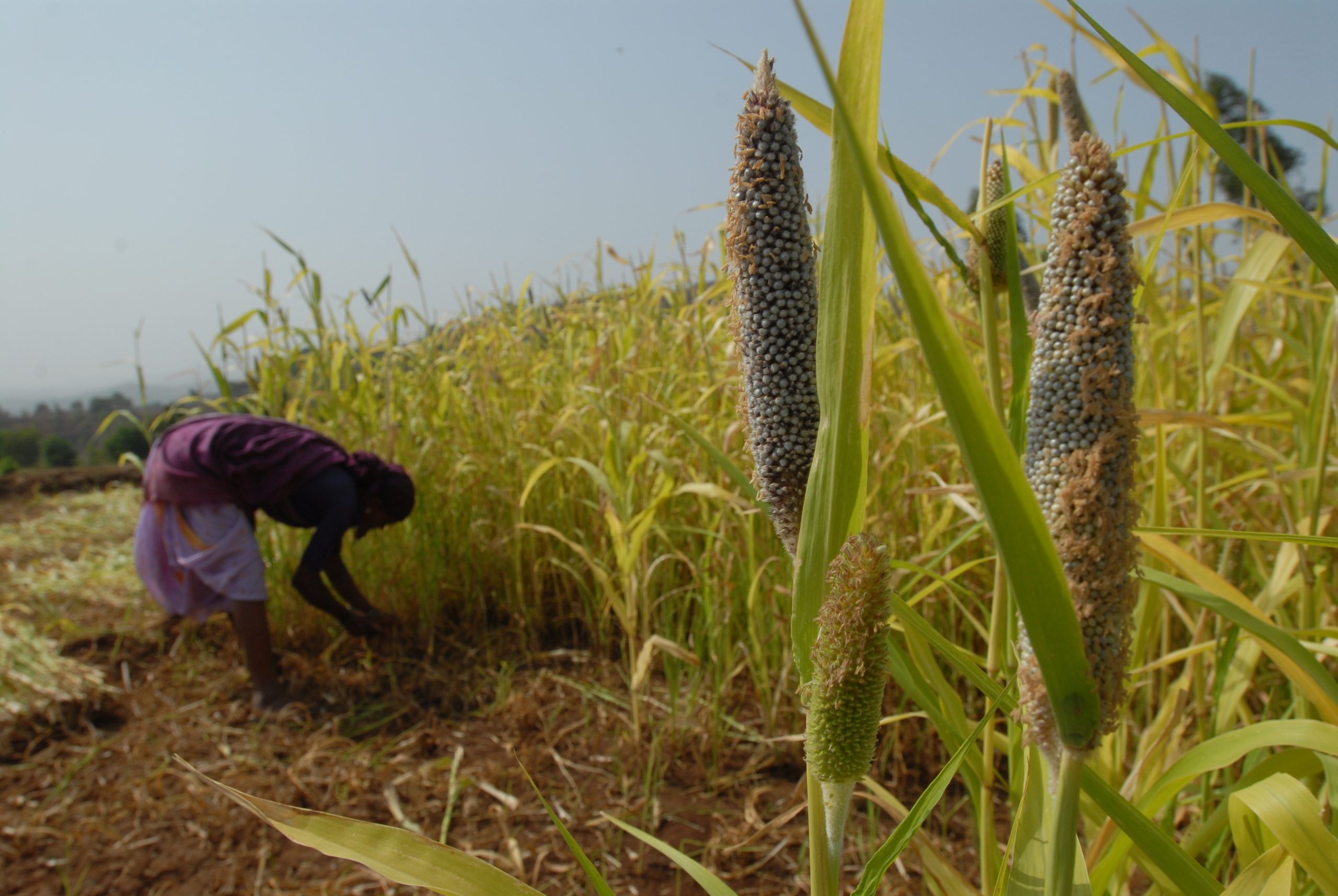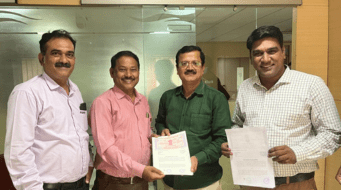~ by Anukriti Shaw
Agriculture plays a significant role in the economies of many developing countries in the Global South. Nonetheless, the sector faces numerous challenges , including climate change, market pressures, land degradation, extreme weather events, and chemical-intensive farming practices.
To address these challenges, an Ecosystem-based Adaptation (EbA) approach offers a nature-friendly and people-centric solution. EbA utilises biodiversity and ecosystem services as a part of an overall strategy to adapt to the adverse effects of climate change (CBD, 2009) while promoting livelihoods that sustain on healthy ecosystems.
EbA can mitigate these challenges by diversifying crops, agroforestry, using environment-friendly methods such as organic pesticides and manure use, and multi-layer farming of local crops resilient to changing climatic patterns. These practices will help in making agriculture sustainable and economically viable.

The Southbound Resilience Webinars to upscale EbA
To effectively address the challenges faced by agriculture, collaboration and knowledge sharing become essential. In light of this, ECOBARI in association with WOTR and W-CReS launched ‘The Southbound Resilience Webinars’ on June 8, 2023. Supported by Honeywell, the first webinar in the series aimed to highlight specific aspects of upscaling EbA in the context of agriculture, namely digital extension services and community-based social and agroforestry.
The webinar served as a strategic platform, offering crucial insights that support the ambitious goal of upscaling EbA. This mission was advanced through engaging presentations by two prominent organizations. – Digital Green and Gram Vikas.
Insights from the Webinar-Perspectives of Digital Green and Gram Vikas
During the webinar, moderator, Manjula M from Azim Premji University set the context by highlighting the disparity in the Indian economy between 1993-2019, where agriculture’s share in GDP declined while its share in employment remained high. This discrepancy, along with the sector’s contribution to climate change and the potential loss of crop production due to climate change, emphasised the need for identifying greater synergies between adaptation and mitigation approaches.
In this context, EbA offers a practical and equitable transition path. This approach promotes nature-based solutions to foster ecosystem services in the rural agrarian sector to effectively tackle climate change challenges while aligning with global commitments to reduce greenhouse gas emissions.
Digital Green, a development organisation, leverages technology and data to create prosperous agricultural communities. Their community-centric approach enhances the effectiveness and efficiency of agricultural extension services through scalable technologies and data-driven decision-making. As of now, Digital Green’s initiatives have reached over 2.5 million small-scale farmers in India, Kenya, and Ethiopia.
With a particular emphasis on women farmers, Digital Green works towards increasing farmer incomes and improving agricultural yields. Their collaborative projects in Bihar estimate greenhouse gas emissions at the farm-level and customise advisories with the aim to reduce emissions by improving agricultural practices.

Dr. Rohit Sharma from Digital Green discussed how they promote data-backed decision-making among farmers and Farmer Producer Organisations (FPOs), which enables them to make informed market choices and improves livelihoods. He shared examples of their work in Odisha, where they promote data-backed decision-making which contributes to better incomes, improved farming techniques and builds resilience.
He further emphasised the importance of equitable participation and utilisation of biodiversity and ecosystem services to enhance the resilience of agricultural communities for an ecosystem-based approach to agriculture.
Gram Vikas, an Odisha-based NGO with a legacy of 44 years, also expressed its commitment to contribute towards the SDG goals by upscaling EbA. Through a community-centric approach, Gram Vikas’s Water Secure Gram Panchayat (WSGP) Programme addresses water and livelihood challenges caused by climate change. The WSGP Programme comprises four components: Equity and Resilience, Sustainability, Safety, and Prosperity.
By empowering rural communities to manage their natural resources, Gram Vikas ensures equitable water access, resource conservation and community resilience in the face of climate-related vulnerabilities.
Representing Gram Vikas, Ashutosh Bhat and Pratap Chandra Panda presented their insights on the Community-Owned Social and Agroforestry initiative. They highlighted the active involvement of youth, women’s self help groups (SHGs) and village development committees (VDCs) in managing springs, creating security plans and maintaining indigenous species. They emphasised the significance of community ownership and sustainability which are an important part of an EbA approach.
They discussed the positive outcomes which encompassed increased green cover, improved soil moisture, enhanced water sources and economic stability in households, even during the COVID-19 pandemic. The effectiveness of healthy ecosystems and their services in fostering a culture of resilient income generation was evident from these outcomes.

Highlights from the Webinar
The webinar discussions highlighted pivotal aspects of EbA in agriculture, emphasising technological interventions, community participation, and value chains. The significance of user experience and software platforms was emphasised, as accessible platforms drive engagement, enable knowledge sharing, and contribute to sustainable agricultural practices.
Financial services and value chains were recognised as important drivers, providing farmers with a comprehensive understanding of the agricultural production process, promoting transparency, fair trade, and sustainability. Payment systems valuing non-market ecosystem services, such as agroforestry, were identified as motivators for farmers to adopt sustainable practices at a larger scale, contributing to healthier ecosystems. Water Passbooks were highlighted as democratising tools, enabling informed decision-making on water management.
Digital Green’s data-driven approaches and community engagement enhance agricultural practices, build capacities, and promote participatory governance, aligning with EbA principles. Additionally, Gram Vikas’s Water Secure Gram Panchayat and agroforestry initiatives exemplify the power of community participation and ownership, strengthening adaptive capacities and generating resilient incomes, in line with the EbA approach.

Building Resilience through Ecosystem-based Adaptation
‘The Southbound Resilience Webinars: Session 1 on EbA and Agriculture’ served as a platform to explore the potential of Ecosystem-based Adaptation in addressing agricultural challenges in the Global South. Adapting to EbA requires addressing three pillars: promoting participatory governance, building adaptive capacities, and utilising biodiversity and ecosystem services to derive resilient incomes. These pillars work together to create a comprehensive and effective strategy that addresses climate change in a holistic manner.
The webinar’s objectives extend beyond the event itself, with an objective to expand ECOBARI’s network and curate a knowledge portal of resources specific to EbA. Joining ECOBARI provides access to a diverse community of EbA experts and practitioners, aiding individuals to learn and upscale EbA through active participation in workshops, webinars, and collaborative projects. And it is through such collaborative efforts that ECOBARI seeks to contribute to upscaling EbA in India and the Global South.
Related Links:
- Join ECOBARI: https://docs.google.com/forms/d/1CfSSFAa0O-6z1UAaIo5jMHM_35e_Ws8YXqjNkUd5lSE/viewform?pli=1&pli=1&edit_requested=true
- ECOBARI – Upscaling Ecosystem Restoration Through Collective Action: https://wotr.org/2022/02/23/ecobari-upscaling-ecosystem-restoration-through-collective-action/
- Digital Green’s Presentation: https://wotr-website-publications.s3.ap-south-1.amazonaws.com/Digital+Green+_+Dr+Rohit+Sharma+_ECOBARI+Deck+_8+June+2023.pdf
- Gram Vikas’s Presentation: https://wotr-website-publications.s3.ap-south-1.amazonaws.com/Gram+Vikas_ECOBARI_07062023_pdf.pdf





